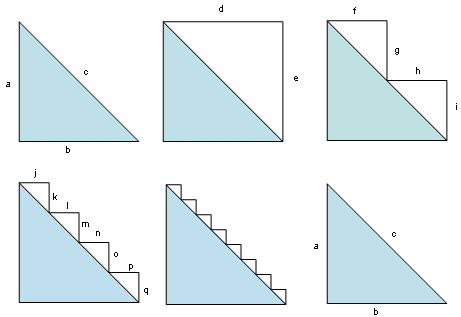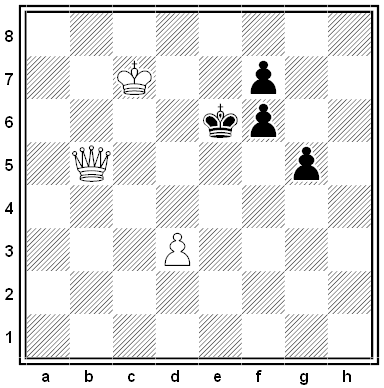A group of children are standing outside a room. Each wears a hat that’s either red or blue, and each child can see the other children’s hats but not her own. At a signal they enter the room one by one and arrange themselves in a line partitioned by hat color. How do they manage this without communicating?
Dry Humor

Jokes from the Dust Bowl:
The drought was so bad that when one man was hit on the head with a rain drop, he was so overcome that two buckets of sand had to be thrown in his face to revive him. Housewives supposedly scoured pans clean by holding them up to a keyhole for sandblasting, and sportsmen allegedly shot ground squirrels overhead as the animals tunneled upward through the dust for air. Some farmers claimed that they planted their crops by throwing seed into the air as their fields blew past and that birds flew backwards to keep the sand out of their eyes.
In 1935 Dalhart Texan editor John McCarty founded a Last Man’s Club in which each member took an oath: “In the absence of an act of God, serious family injury, or some other emergency, I pledge to stay here as the last man and to do everything I can to help other last men remain in this country. We promise to stay here till hell freezes over and skate out on the ice.”
As a joke he proposed to build a huge hotel amid the dunes north of Dalhart where tourists would pay “fancy prices” for the privilege of witnessing the “noble grandeur an imposing beauty of a Panhandle sandstorm.” “We’ve got the greatest country in the world if we can just get a few kinks straightened out,” he wrote. “Let’s keep boosting our country.” About 100 people joined the club; more said they wanted to do so but acknowledged they were afraid they’d have to leave.
(From R. Douglas Hurt’s The Dust Bowl: An Agricultural and Social History, 1981.)
Black and White
In a Word

interturb
v. to disturb by interrupting
In late 1908 Douglas Mawson, Alastair Mackay, and Edgeworth David left Ernest Shackleton’s party in hopes of discovering the location of the South Magnetic Pole. On Dec. 11, while Mackay left the camp to reconnoiter, David prepared to sketch the mountains and Mawson retired into the tent to work on his camera equipment:
I was busy changing photographic plates in the only place where it could be done — inside the sleeping bag. … Soon after I had done up the bag, having got safely inside, I heard a voice from outside — a gentle voice — calling:
‘Mawson, Mawson.’
‘Hullo!’ said I.
‘Oh, you’re in the bag changing plates, are you?’
‘Yes, Professor.’
There was a silence for some time. Then I heard the Professor calling in a louder tone:
‘Mawson!’
I answered again. Well the Professor heard by the sound I was still in the bag, so he said:
‘Oh, still changing plates, are you?’
‘Yes.’
More silence for some time. After a minute, in a rather loud and anxious tone:
‘Mawson!’
I thought there was something up, but could not tell what he was after. I was getting rather tired of it and called out:
‘Hullo. What is it? What can I do?’
‘Well, Mawson, I am in a rather dangerous position. I am really hanging on by my fingers to the edge of a crevasse, and I don’t think I can hold on much longer. I shall have to trouble you to come out and assist me.’
I came out rather quicker than I can say. There was the Professor, just his head showing and hanging on to the edge of a dangerous crevasse.
David later explained, “I had scarcely gone more than six yards from the tent, when the lid of a crevasse suddenly collapsed under me. I only saved myself from going right down by throwing my arms out and staying myself on the snow lid on either side.”
Mawson helped him out, and David began his sketching. The party reached the pole in January.
In a Word

antelucan
adj. before dawn
finitor
n. the horizon
flavescent
adj. turning pale yellow
day-peep
n. the first appearance of daylight; the earliest dawn
Eoan
adj. of or pertaining to the dawn; eastern
Young Riders

Sons of Jack “Catch-‘Em-Alive” Abernathy, the youngest U.S. Marshal in history, Louis and Temple Abernathy inherited their father’s self-reliance: In 1910, when they were 10 and 6 years old, they rode on horseback from their Oklahoma ranch to Manhattan to greet Theodore Roosevelt as he returned from Africa. After riding behind Roosevelt’s car in a ticker-tape parade, they drove home in a new car.
The following year, apparently bored, they accepted a $10,000 challenge to ride on horseback from New York to San Francisco in 60 days or less, never eating or sleeping indoors. They missed the deadline by two days but still established a speed record. And in 1913 they rode by motorcycle from Oklahoma to New York City.
The two went on to successful careers in law and oil. “Teach a boy self-reliance from the moment he tumbles out of the cradle, make him keep his traces taut and work well forward in his collar, and 99 times out of a hundred his independence will assert itself before he is 2 years old,” their father told a newspaper after their first trip. “That’s my rule, and if you don’t think I’ve taken the right tack talk to my boys for five minutes and they’ll convince you that they are men in principles even if they are babies in years. God bless ’em.”
Book Codes

Benedict Arnold encrypted his messages to the British Army using Blackstone’s Commentaries on the Laws of England. Arnold would replace each word in his message with a triplet of numbers representing the page number, line number, and word position where the word might be found in Blackstone. For example:
The 166.8.11 of the 191.9.16 are 129.19.21 266.9.14 of the .286.8.20, and 291.8.27 to be on 163.9.4 115.8.16 114.8.25ing — 263.9.14 are 207.8.17ed 125.8.15 103.8.60 from this 294.8.50 104.9.26 — If 84.8.9ed — 294.9.12 129.8.7 only to 193.8.3 and the 64.9.5 290.9.20 245.8.3 be at an 99.8.14.
British Army Major John André could then look up the words in his own copy of Blackstone to discover Arnold’s meaning:
The mass of the People are heartily tired of the War, and wish to be on their former footing — They are promised great events from this year’s exertion — If disappointed — you have only to persevere and the contest will soon be at an end.
The danger in using a book code is that the enemy can decode the messages if he can identify the book — and sometimes even if he can’t. In the comic strip Steve Roper, a reporter once excitedly telephoned the coded message 188-1-22 71-2-13 70-2-11 68-1-25 19-1-6 112-2-10 99-1-35. Reader Sean Reddick suspected that this message had been encoded using a dictionary, with each triplet of numbers denoting page, column, and word number. He never did discover the book that had been used, but by considering the ratios involved and consulting half a dozen dictionaries he managed to break the code anyway — he sent his solution to a nationally known columnist, who verified his feat when the comic strip bore out his solution. What was the message? (Hint: In the comic, the reporter mentions significantly that the plaintext message was given to him by “the delivery boy.”)
The Pythagoras Paradox

Draw a right triangle whose legs a and b each measure 1. Draw d and e to complete a unit square. Clearly d + e = 2.
Now if we cut a “step” into the square as shown, then f + h = 1 and g + i = 1, so the total length of the “staircase” is still 2. Cut still finer steps and j + k + l + m + n + o + p + q is likewise 2.
And so on: The more finely we cut the steps, the more closely their shape approximates that of the original triangle’s diagonal. Yet the total length of the stairstep shape remains 2, the sum of its horizontal and vertical elements. At the limit, then, it would seem that c must measure 2 … but we know that the length of a unit square’s diagonal is the square root of 2. Where is the error?
(Thanks, Alex.)
One Two Three
Each point on a straight line is either red or blue. Show that it’s always possible to find three points of the same color in which one is the midpoint of the other two.
Gender in Swearing
In An Encyclopedia of Swearing (2006), University of the Witwatersrand linguist Geoffrey Hughes notes that terms of vehement personal abuse seem to attach disproportionately to the male sex:

In his analysis, even terms derived from female anatomy are applied to men rather than women (at least in British usage). Terms such as bugger, motherfucker, and sod[omite] understandably derive from sexual role, but why are devil, fucker, moron, and cretin applied generally to men and not women?
“All the indeterminate terms, such as bastard, idiot, and shit, which should logically be ‘bisexual’ in application, are invariably applied only to males,” Hughes writes. (Also, strangely, there seems to be no vehement term of abuse that’s used freely of both sexes.) “However, the historical perspective shows one significant trend, namely that several of the terms, like bitch and sow, were first used of males (or of both sexes) and only later applied exclusively to women.”


